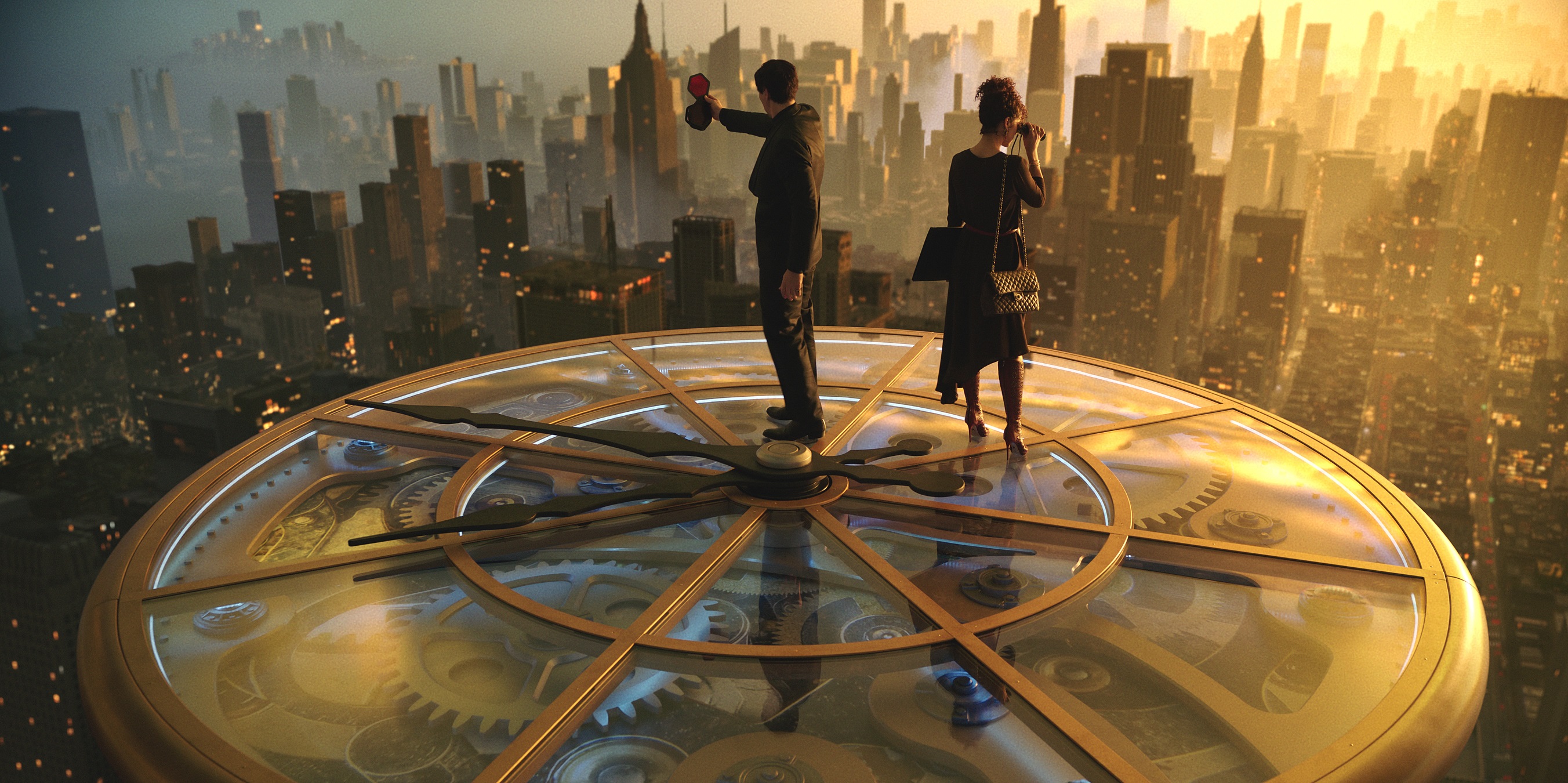“What happens if you’ve overstepped your mandate?” aristocrat-architect Cesar Catalin (Adam Driver) is asked. “I’ll apologise,” he smirks. Francis Ford Coppola’s forty years in the making, self-financed epic is studded with such self-implicating bravado, including a wish to “escape into the ranks of the insane” rather than accept conventional thinking, as if at 85 he is not only Cesar but Kurtz, plunging chaotically upriver again, inviting career termination.
Coppola subtitles Megalopolis “a fable”, and its tale of an imperious architect fighting venal New Rome’s Mayor Cicero (Giancarlo Esposito) while romancing his daughter Julia (Nathalie Emmanuel) is full of such literary self-regard, and theatrical rhetoric which Driver at least locates the rhythm to carry off. New Rome is of course New York, standing for the whole US in a 21st century decline arrestable only by Cesar’s arrogant hand, much as he prevents his own fall from a skyscraper’s windblown peak by simply stopping time. His time-bending powers are avowedly that of an artist, but he wants to remake his city with the futuristic scientific material Megalon. Coppola’s attempt to write a great film encompassing all his philosophical and historical interests sometimes resembles Wim Wenders’ post-Wings of Desire epics, whose baldly stated big themes compared terribly to his earlier work’s implicit enrichment by the state of things. His vision of America’s neoclassical decline is a patchwork of Roman and US history, décor, architecture and fashion, and draws on contemporary parallels. Priapic blond plutocrat Crassus III recalls Trump (whose fan Jon Voight was assured otherwise when he took the role), police pull brutal traffic-stops, and Cicero’s hasty flight from the mob’s assault on City Hall echoes Trump voters’ rampage through Congress.
Coppola’s attempt to write a great film encompassing all his philosophical and historical interests sometimes resembles Wim Wenders’ post-Wings of Desire epics, whose baldly stated big themes compared terribly to his earlier work’s implicit enrichment by the state of things. His vision of America’s neoclassical decline is a patchwork of Roman and US history, décor, architecture and fashion, and draws on contemporary parallels. Priapic blond plutocrat Crassus III recalls Trump (whose fan Jon Voight was assured otherwise when he took the role), police pull brutal traffic-stops, and Cicero’s hasty flight from the mob’s assault on City Hall echoes Trump voters’ rampage through Congress.
Megalopolis’s most dated, octogenarian aspect is its insultingly underwritten female roles, from Julia’s insipid take on Shakespeare’s Juliet to sexy finance journalist Wow Platinum sleeping her way to the top (played at least with moxy by Aubrey Plaza, pictured below). Great Men meanwhile plot the future. Coppola was inspired by the H.G. Wells-scripted Things To Come (1936) and its super-scientist world rulers, and he is of course on Cesar’s side as he demands a neighbourhood’s erasure as a site for Megalon, over its malleable mob of immigrant citizens' objections. Democracy holds little real appeal to American cinema’s ageing emperor.
 Coppola risks dross with his bureaucratic intrigues, eccentric story material last essayed in a major release by his New Hollywood confrere George Lucas’s Star Wars Episode I: The Phantom Menace, but mines gold in the cinematic language he invents for his wizard-architect’s creation. He quixotically favoured green screen and live in camera effects over digital seamlessness, and typically made his son Roman consigliere in these matters much as he was on Bram Stoker’s Dracula (1992), whose primordially cinematic, gaslight son et lumière it most resembles.
Coppola risks dross with his bureaucratic intrigues, eccentric story material last essayed in a major release by his New Hollywood confrere George Lucas’s Star Wars Episode I: The Phantom Menace, but mines gold in the cinematic language he invents for his wizard-architect’s creation. He quixotically favoured green screen and live in camera effects over digital seamlessness, and typically made his son Roman consigliere in these matters much as he was on Bram Stoker’s Dracula (1992), whose primordially cinematic, gaslight son et lumière it most resembles.
Cesar’s debased bacchanal during Crassus and Wow’s Madison Square Garden marriage is trippy, the camera close-up on his dissolving state in a crimson club then hitting vibrating fast-forward, viscerally in the moment. Individuals achieve smoke and mirror multiplication, and split-screens homage Gance’s Napoleon (1927). Megalon’s effects are meanwhile painterly and organically liquid, as red cells stretch like tendons, urban architecture grows jungle wild, and cinema becomes a hallucinatory light-show. As far out on a limb as Coppola has stepped, he could have gone further, surrendering his literary themes and theatrical style for this pure cinema rush. And yet the awkward collision of stagey dialogue, half-digested philosophy and delirious new Méliès dreams makes Megalopolis its own towering, toppling thing.
Koyaanisqatsi cinematographer Ron Fricke’s richly textured, time-lapsed New York footage from 2001, when 9/11 nixed Coppola’s first serious Megalopolis foray, cranes up from the street at imperial 20th century edifices. As conspirators plot, Coppola’s regular 21st century cinematographer Mihai Malaimare meanwhile paints inky pools of noir shadow in a mansion as thunder cracks, recalling the Corleones under siege. A nocturnal car chase between Cesar, Julia and Clodio also feels intensely real, the people and streets lush with life. Flatly shot sound-stage scenes elsewhere blow the illusion.
Coppola’s concluding faith in humanity’s world-saving creative potential is quite moving, even if that promethean spark primarily resides in Cesar, and himself, as he revisits cinema’s dawn to conjure fresh magic.
- More film reviews on theartsdesk













Add comment